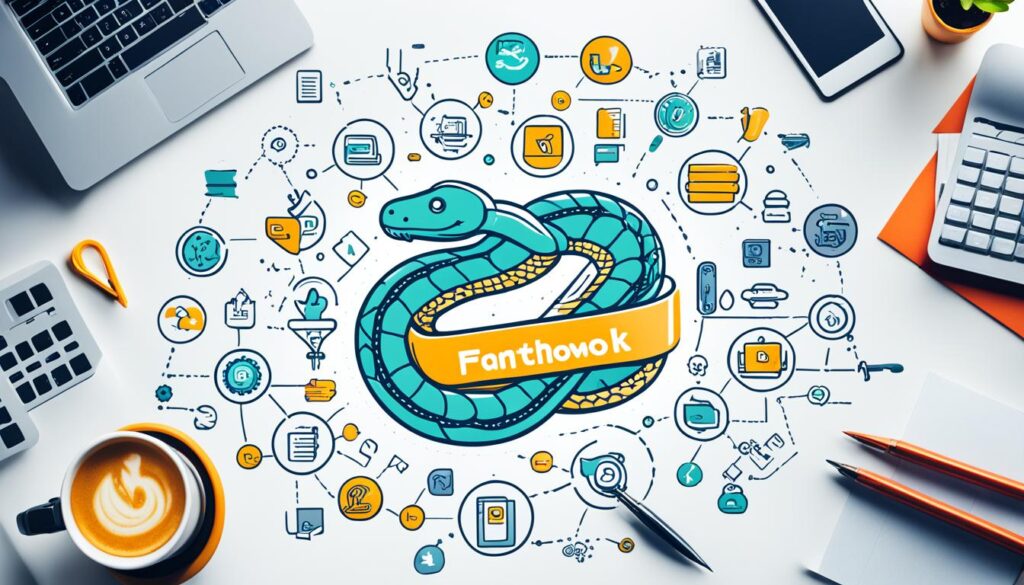Python3 Benefits for SaaS Development Explained
Wednesday, 5/8/2024, 8 minutes to read

When it comes to choosing SaaS development frameworks, it’s crucial to select a language that not only streamlines the process but also yields efficient and robust cloud-based software solutions. Python programming, with its latest version Python3, stands out as a top contender. The rich Python3 features have been explicitly developed to meet the intricate demands of modern SaaS platforms, making it a preferred choice for developers aiming for excellence in the rapidly evolving digital marketplace.
Python3, the successor to the Python programming language, brings to the table a wealth of benefits tailored for effective SaaS development. Its diverse capabilities simplify the complexities associated with creating and maintaining versatile SaaS applications, by providing the tools necessary to build high-quality, cloud-based software solutions in a highly competitive tech environment.
Key Takeaways
- Python3’s efficacy in developing SaaS platforms by leveraging powerful SaaS development frameworks.
- The significance of Python programming in the realm of SaaS for creating impactful cloud solutions.
- A deep dive into Python3 features and their role in enhancing the developer experience.
- An understanding of Python3’s compatibility with evolving cloud-based software solutions.
- Insights into the strategic advantages of Python3 in crafting reliable and user-friendly SaaS applications.
Enhancing Productivity with Python3’s Simplified Syntax
In the realm of software development, particularly when considering the fast-paced environment of rapid SaaS development, the clarity offered by a language is not merely a convenience but a necessity for maintaining a brisk production cycle. Python3 stands out in this regard, offering a simplified syntax that underscores readability, thus enabling developers to craft code that is as intuitive as it is efficient.

The Power of Readability in Python3
Code readability is a fundamental aspect that Python3 has championed fervently. The language’s distinct approach to syntax minimizes possible misunderstandings and provides a universal format that developers can easily interpret. By emphasizing readability, Python3 ensures that even those new to the language can understand complex constructs with ease, expediting the learning curve and boosting overall developer productivity.
Rapid Development with Built-in Libraries
A standout feature of Python3 that significantly accelerates rapid SaaS development is its extensive selection of built-in libraries. Whether it’s data analysis, image processing, or web framework support, Python3 comes equipped with a well-stocked arsenal ready to tackle a myriad of development tasks. This abundance of tools permits developers to avoid reinventing the wheel, allowing them to concentrate on the unique aspects of their SaaS projects.
Ducking Type Issues with Dynamic Typing
Further reinforcing the language’s commitment to efficiency, Python3 employs dynamic typing, a feature that can alleviate the common bottlenecks associated with type declaration in statically-typed languages. This dynamic approach allows for a more flexible and forgiving coding process, removing potential hurdles and paving the way for developers to realize their creative solutions without the distraction of rigid type constraints.
Empowered by its simplified syntax, the emphasis on readability, a suite of ready-to-use built-in libraries, and the liberating nature of dynamic typing, Python3 is a formidable ally in the quest for efficient and rapid SaaS development.
Python3 Advantages in Building Scalable SaaS Platforms
Mastering the art of scalability is a pivotal factor in the success of any modern Software as a Service (SaaS) application. Python3 rises to this challenge with an ecosystem that boasts remarkable Python3 scalability and versatile frameworks. These strengths are instrumental in designing systems that not only meet current user demands but are also future-proof, ensuring longevity in the fast-evolving tech landscape.
Fostering Growth with Python3’s Scalability
One of the fundamental tenets of scalable SaaS development is the ability to handle increased workloads without compromising on performance. Python3 embraces this concept with open arms, offering a level of scalability that enables platforms to expand seamlessly. This scalability is partly due to the language’s dynamic nature and efficient memory management, which when combined with horizontal scaling strategies, can meet the demands of growing applications.
Benefiting from Python3’s Versatile Frameworks

Frameworks play a crucial role in providing structured and standardized approaches to SaaS application development. Python’s repertoire includes versatile frameworks like Django and Flask, which simplify the creation of complex applications. Django, known for its „batteries-included” approach, is particularly adept at building scalable SaaS platforms due to its reusable components and scalability options. Meanwhile, Flask offers flexibility, catering to developers who prefer a minimalistic framework for their services.
Effortless Integration with Cloud Services
Integration with cloud services is at the heart of SaaS, and Python3 shines brightly in this arena. Its compatibility with major cloud providers ensures that developers can harness the full power of cloud computing, from storage solutions to processing capabilities. Python3’s standard library includes modules that facilitate integration with cloud services, enabling developers to focus on innovation rather than getting bogged down by infrastructure details.
| Framework | Scalability | Use Case |
|---|---|---|
| Django | High | Full-featured web applications |
| Flask | Medium to High | Microservices and lightweight applications |
| Pyramid | Medium | Applications requiring rapid prototyping |
Python3’s arsenal is not just limited to scalability and ease of integration; its clear syntax and powerful libraries further equip developers to engineer robust, scalable SaaS development projects. The language’s focus on developer productivity and operational efficiency makes it an ideal candidate for companies aiming to build sustainable and adaptable SaaS platforms, ready to evolve with the accelerating pace of technological advancements.
Conclusion
Throughout this exploration of Python3 as a cornerstone for developing robust and adaptable SaaS applications, the strategic advantages of Python3 have been made evidently clear. By offering developers a language that is not only powerful but also intuitive, Python3 aligns perfectly with the ambitious goals of successful SaaS development. Its clear-cut syntax and dynamic typing fundamentally improve the efficiency of coding, checks, and deployment, showcasing its position as a frontrunner in the SaaS innovation arena.
Moreover, Python3’s scalability is a key attribute that allows SaaS platforms to evolve without incurring drastic restructuring costs or delays. This scalability, alongside the language’s seamless integration with cloud services, ensures that businesses are equipped to handle growth and the changing demands of a digital-first customer base. The versatility of frameworks available within Python3 further solidifies its role as an enabler of enterprise innovation, delivering versatile solutions that uphold the rigorous demands of modern software development and deployment.
In drawing this article to a close, it bears emphasizing that the union of Python3 and SaaS development represents an intersection of agility, efficiency, and scalability. The language’s design and the ecosystems it interoperates with are continually contributing towards a landscape where inventive SaaS platforms are not just envisioned, but meticulously executed, consequently nurturing the digital economy. For developers, strategists, and businesses alike, Python3 is more than just a programming language; it is an instrument that fosters success in the ever-expanding realm of cloud-based software solutions.
FAQ
What makes Python3 an ideal choice for SaaS development?
Python3 is favored for SaaS development due to its powerful features that lend themselves to creating efficient, reliable, and user-friendly cloud-based software solutions. Its compatibility with modern practices and ability to support the rapid evolution of SaaS platforms contribute to its popularity.
How does Python3’s simplified syntax enhance developer productivity?
Python3’s simplified syntax emphasizes code legibility and conciseness, which means developers can write fewer lines of code compared to other languages. This not only speeds up the development process but also makes it easier for teams to collaborate and maintain code over time.
Can Python3’s built-in libraries speed up the SaaS development process?
Absolutely! Python3 comes with a rich set of built-in libraries that are tailored to handle a wide array of programming tasks. This allows developers to quickly add functionality to their SaaS applications without the need to write boilerplate code from scratch.
What are the benefits of dynamic typing in Python3 for SaaS development?
Dynamic typing in Python3 means that the type of a variable is determined at runtime, not in advance. This provides a degree of flexibility and can help developers solve type-related issues more efficiently, which can otherwise be time-consuming in statically-typed languages.
How does Python3 support the scalability of SaaS platforms?
Python3’s design and architecture allow for easy scaling of applications, which is critical for SaaS platforms that need to accommodate growing numbers of users or handle large data volumes. Its scalability ensures that a SaaS platform can evolve without sacrificing performance.
Are Python3’s frameworks suited for building versatile and scalable SaaS platforms?
Yes, Python3 offers a variety of frameworks, like Django and Flask, which are known for their versatility and are highly regarded in the development of scalable SaaS platforms. These frameworks provide developers with the tools required to construct robust and scalable services.
How does Python3 facilitate integration with cloud services?
Python3 has inherent capabilities that simplify the integration with cloud services. Its various libraries and tools streamline the process of connecting to cloud platforms, allowing SaaS applications to fully utilize the advantages of cloud computing, such as scalability, reliability, and distributed computing.
What strategic advantages does Python3 offer for successful SaaS development?
Python3 offers strategic advantages such as rapid development cycles, scalability, a wide range of third-party modules, and ease of integration with other technologies. These factors make it an asset for businesses looking to innovate and successfully execute SaaS development projects.
Other blog posts
Revolutionize your business with cutting-edge technology!
Let’s Bring Your Vision to Life—Contact Us Today!
📝 Get an Estimate